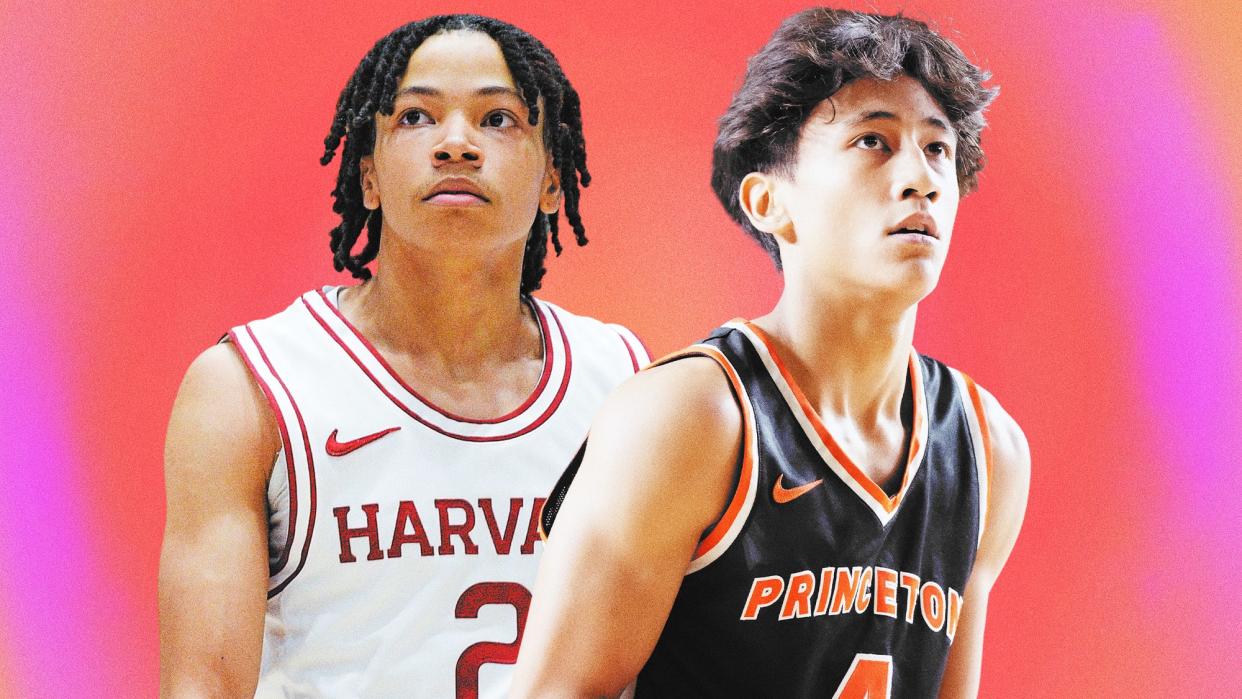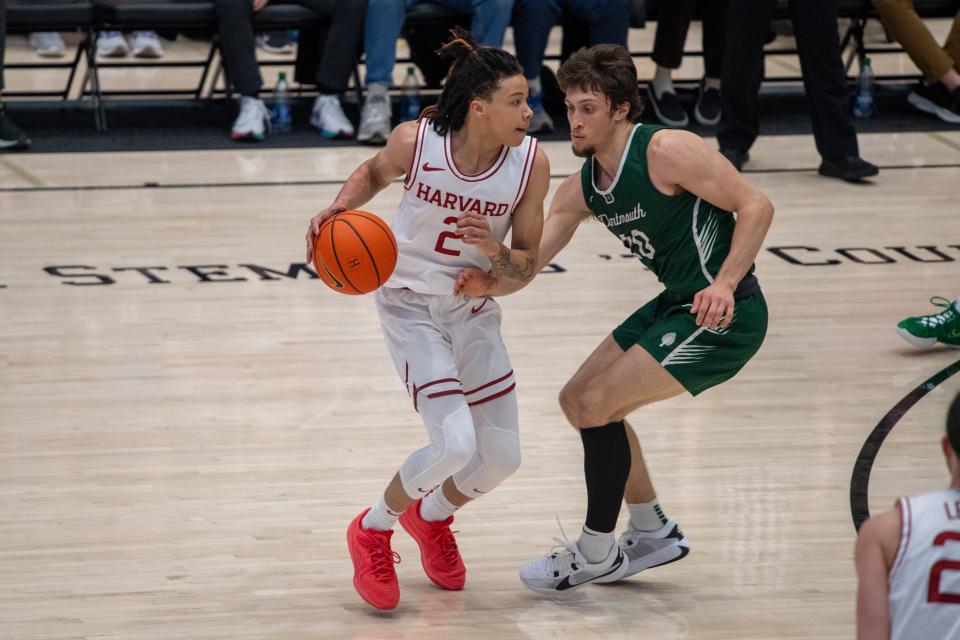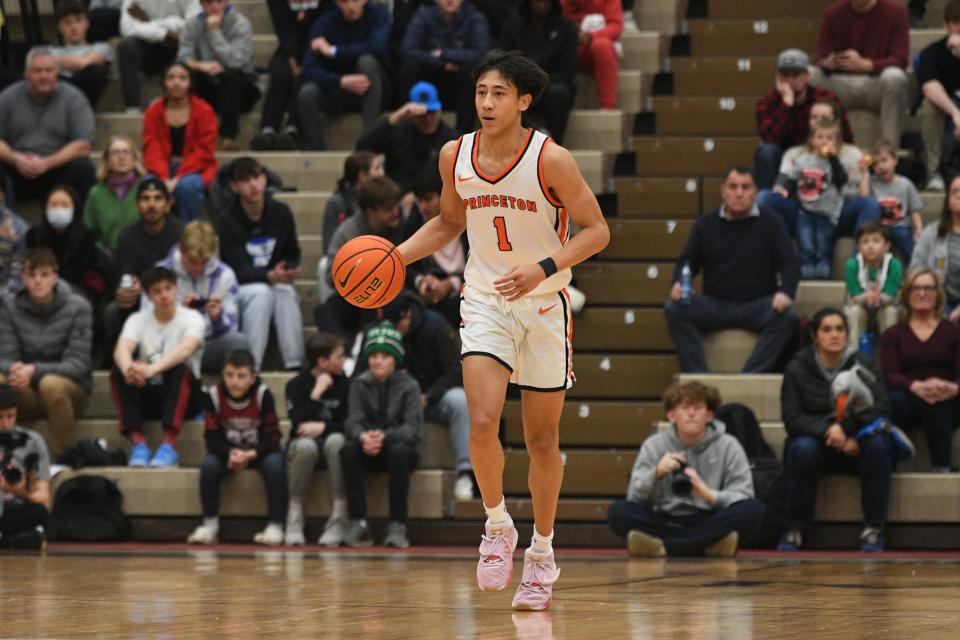The Unlikely Rise of the Ivy League Hooper

- Oops!Something went wrong.Please try again later.
- Oops!Something went wrong.Please try again later.
Photographs: Getty Images; Collage: Gabe Conte
One of the coldest hoopers in college basketball moves like a Gen Z influencer. Xaivian Lee has moppy hair, rocks tiny diamond studs in each ear, and saunters around campus – where the combo guard’s fame is quickly rising – clutching a pink hydration bottle and sporting vintage Ralph Lauren rugby shirts. He speaks using emojis (he’s a fan of the surfing emoji) on Instagram and dabbles in vlogging when he feels like it.
On the court, Lee, who is of Korean descent, is just as smooth. He can hit stepback threes like Harden and owns a Kyrie-esque layup package. Catch him in transition? It’s likely a dunk. At press time, the six-foot-three super sophomore is averaging nearly 18 points (nearly quadrupling his scoring output from last season) and 6 boards, including dropping a 30 piece on Northeastern and another 23 on Drexel.
The highlights, the stats, the unassuming complex—it's all made him something of a viral sensation. His Instagram mixtapes on Bleacher Report and Ball is Life are becoming legendary, amassing almost 400,000 likes combined.
But here’s the plot twist: He is doing it all from the posh Ivy League, where Lee and his Princeton Tigers are gunning for a spot in the Final Four (don’t laugh: the Tigers were 21-3 at press time).
“I think we're just really hard to scout because of the way we play,” says Lee, a native of Toronto. “But definitely, we think we can be anybody.”
Lee isn’t a one-off phenomenon. Some four hours north of Princeton, New Jersey, in Cambridge, Massachusetts, another diminutive guard, Malik Mack is also providing the Ivy League with some much-needed drip. In his neatly symmetrical braids, the shifty lefty uses hesis, crossovers and footwork to break down defenders as a member of the Harvard Crimson. Mack, a six-foot-one freshman, scores at will and possesses elite point guard vision. After he gave crosstown rival UMass 32 points and another 27 on Indiana early in the season, Bleacher Report posted a viral IG mixtape titled, “Best Freshman in the Country?”
“Both Malik Mack and Xaivian Lee could play anywhere,” says longtime ESPN college basketball analyst Jay Bilas. “But what I think is interesting is that they chose Harvard and Princeton as the best environment and situation for them.”
The Ivy League, of course, is home to future senators and masters of the universe, not hoops royalty. But a fresh new crop of swaggy stars led by Mack and Lee (both 19 years old) and including emerging ballers like Kino Lilly Jr. (Brown), Danny Wolf (Yale), Jayden Williams (Dartmouth), Chris Manon (Cornell) and Caden Pierce (Princeton) are forcing fans—especially the TikTok generation—to look at Ivy League basketball with a fresh perspective and appreciation.
“I think it's our style of play, just the way we play the game,” Mack says of what’s resonating with mainstream fans. “They see two guards who have free rein with their teams.”
Lee adds: “Younger guys like me and Malik bring a little bit of that fun to the game that maybe people don't expect from a Harvard or Princeton player.”

COLLEGE BASKETBALL: FEB 10 Dartmouth at Harvard
Icon Sportswire/Getty ImagesLet’s make this much clear: Ivy League schools compete in Division 1. The quality of play is high. But even with Princeton’s magical Sweet 16 appearance last year, during which Lee came off the bench, the Ivy League still fights a stigma. Too white. Too boring. Too predictable. Too stuck in its ways. The conference still does not give athletic scholarships, nor are players granted red-shirt years.
“I thought there was an interesting kind of pride that the Ivy League seemed to take in living in their own insular world,” says Bilas. “That, ‘We do it this way and we don't care if we went outside of the Ivy League.’”
Bilas points to Harvard’s hire of head coach Tommy Amaker, in 2007, as a turning point. Amaker, Bilas says, “changed the Ivy League,” crediting him for increasing diversity, improving recruiting (four-star recruits now consider the conference), and implementing a more current style of play. “Coach Amaker had a large role in my reason to come to Harvard,” says Mack, who like Amaker is Black. Mack also took into consideration that his future coach helped develop Jeremy Lin, a Harvard product who played nine NBA seasons including the iconic and improbable ‘Linsanity’ run with the Knicks in 2012. “So [Lin’s] story and just what he was able to do gave me a boost of confidence that maybe I could do the same thing.”
But even with the progress, the league is still at a disadvantage. The exposure and the TV deals are not nearly as sweet as they are for a Power Five conference like the ACC or SEC. There are the famously stringent academic standards to take into account, too.
And even if you scored high on the SAT, Bilas notes, “You're gonna have to pay something to go to the Ivy League,” because the conference offers financial aid rather than merit-based scholarships. That means schools still lean on scholar-heavy prep schools, and target under-recruited talents like Lee (who received zero other D1 offers) and undersized stars like Mack, who was named Gatorade’s high school player of the year in DC last season.
If we have learned anything from Stephen Curry’s time at Davidson or Ja Morant at Murray State, it’s that it doesn’t matter where you play but rather what you do when you get there. “Had [Mack and Lee] gone to North Carolina, Duke or somewhere like that, they would not get the kind of minutes they're getting,” Bilas says, “Nor would they be in the roles they're in.”
Nor would they be likely currently trending on Instagram and TikTok. Mack and Lee both pass the eye test—their production and skill sets are hard to dispute on IG Reels. Both are good looking and possess that all-so-coveted rizz. But maybe where they happen to go to school has some clout, too. The Ivy League has long been synonymous with prestige, class, and style—the recent rise of basketball stars perhaps adds to the distinguished gentleman aura.
“I feel like a lot of Ivy League schools—everyone has their quiet confidence about them,” Mack says. “There's not a lot of rah-rah or a lot of talking trash.”

COLLEGE BASKETBALL: FEB 03 Princeton at Brown
Icon Sportswire/Getty ImagesThe Ivy League’s newest stars faced off for the first time in early January, at Princeton's ancient Jadwin Gymnasium. Lee and Mack didn’t acknowledge each other. New-school players, but signs of an old-school rivalry?
“I'm really competitive,” says Mack. “So, even if I know you, I won't talk to you before the game. I haven't really talked to Xaivian before. I respect his game, I respect who he is as a player.”
Lee got the better of the battle, scoring 33 points, grabbing 8 boards, and dishing out 7 dimes. The way he created space conjured flashbacks of another baby-faced assassin a generation ago at Davidson. Mack, just back after missing a month with mononucleosis, struggled with 8 points on 3-11 shooting, and Princeton won by 30.
This past weekend, Princeton made the trek to Cambridge and picked up another win, with Lee piling up a gaudy 27-9-6 line. But Mack-versus-Lee and Harvard-versus-Princeton are likely to be storylines beyond the confines of the Northeast for the next few years.
“There's no question that players like Malik Mack and Xaivian Lee will be dangerous and elevating for their teams and the league as long as they stay at Harvard and Princeton,” says Bilas. “And one or both of them are going to play in the NCAA tournament without question.”
Mack and Lee do not look, play, or move like the Ivy League players of the past. Both have NBA aspirations, and it doesn’t seem crazy to think that they both could get there. Lately, Lee has noticed more people have approached him around campus seeking autographs or pictures. Media outlets from both the United States and his native Canada have been catching on.
“Yeah, it's definitely cool to get that recognition,” he says. “It doesn't really change too much for me though. We’re practicing every day to get better.”
Winning the Ivy League championship and exceeding last year’s NCAA Tournament run is all that matters right now to Lee and his Tigers. The attention, of course, is nice. “Followers,” he says, “have kind of picked up.”
Originally Appeared on GQ

